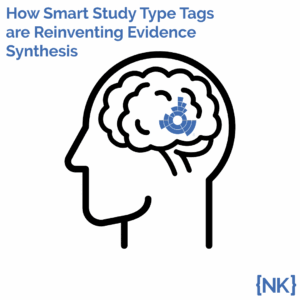
How Smart Study Type Tags Are Reinventing Evidence Synthesis
One of the features of Core Smart Tags is Smart Study Type – this refers to our AI system that automatically categorises the study type
Nested Knowledge at ISPOR Europe 2025: Advancing AI in Evidence Synthesis
Nested Knowledge is proud to have a major presence at ISPOR Europe 2025, with multiple panels and posters highlighting the validation, application, and impact of artificial intelligence (AI) in health technology assessment (HTA), evidence synthesis, and payer decision-making. From independent validation studies to expert discussions on AI’s role in systematic literature reviews (SLRs), these sessions underscore the growing global momentum toward transparent, validated, and efficient AI in healthcare research.
Take a peak at where and when you can catch us:
AI in CEE Health System Decision-Making: Can Payers, Patients, and Policy Align for Smarter Access: Polish HTA agency representative, Bosnian Health Insurance Fund member, leading AI-in-SLR expert, and Nested Knowledge CEO Kevin Kallmes
Explored how Central and Eastern European payers and policymakers can use AI tools to harmonize HTA processes, improve transparency, and accelerate access to innovations.
→ Link
Time: Monday, November 10th, 11:45 AM
Location: Hall 1
Code: 032
Battle of the Bots: Navigating the Landscape of AI-Enabled Systematic Literature Review Platforms: Ranita representing Nested Knowledge, alongside DistillerSR and others
A live comparison of AI-powered review tools highlighting accuracy, explainability, and workflow integration, showcasing how Nested Knowledge’s automation and transparency set it apart.
→ Link
Time: Wednesday, November 12th, 10 AM
Location: Connection Zone, Hall 2
Code: 136
AI in Evidence Synthesis: Have We Reached the Promised Land or Are We Still Wandering the Desert? – Certara & Nested Knowledge
A full validation study across every AI-assisted step in Nested Knowledge’s workflow, confirming accuracy, reproducibility, and auditability in automated SLRs.
→ Link
Leveraging AI for Evidence Synthesis: Assessing the Accuracy and Efficiency of AI-Supported Data Extraction and Reporting: Nested Knowledge validation of Smart Meta-Analytical Extraction (SMAE)
Demonstrated >90% extraction accuracy for quantitative results versus manual benchmarks, confirming that AI-assisted meta-analysis can be both fast and reliable.
→ Link
AI Time and Motion: Analysis of the Accuracy and Efficiency of AI for HTA-Standard SLRs: FIECON & Nested Knowledge
Validated Robot Screener, Smart Screener, and Adaptive Smart Tags, showing up to 60% time reduction in screening without compromising quality.
→ Link
Assessing Accuracy of Unsupervised Large Language Model Tools for Identifying Key Criteria Supporting Abstract Screening
Showed that Adaptive Smart Tags can identify PICO-relevant concepts with precision similar to trained reviewers, enabling AI-supported early triage.
→ Link
Data Linkage in Practice: A Living Systematic Review of Clinical Trials in the United States (US) Utilizing Linkage to Real-World Data: Novo Nordisk & Nested Knowledge
Reviewed tokenization practices for clinical trial–real-world data linkage, illustrating how AI and automation support continuous, living evidence synthesis.
→ Link
Enhancing Targeted Literature Reviews (TLRs) with AI: Demonstrated faster TLR completion with Robot Screener while maintaining methodological rigor. → Link
The Elusive PICO: Assessing Prediction in Joint Clinical Assessments (JCA): Applied AI-powered PICO mapping to support alignment with new EU HTA requirements for JCAs.
→ Link
Payer and HTA Evaluation Criteria for Patient Self-Monitoring Technology
Reviewed payer perspectives and emerging frameworks for digital health coverage, powered by systematic evidence synthesis in NK.
→ Link
Integrating Health Equity into HTA: A Scoping Review: Showed how the Nested Knowledge platform supports transparent capture and reporting of equity-related outcomes.
→ Link
Suicidal Behavior and Mortality Risk in Thyroid Cancer: A Systematic Review and Meta-Analysis: Demonstrated clinical insights derived from automated meta-analysis workflows using NK.
→ Link
An Update on the Evolving Use of AI/ML in Systematic Literature Reviews (SLRs): A review of published SLRs using AI tools, confirming growing acceptance of automated workflows in evidence synthesis.
→ Link
Together, these contributions demonstrate a clear trend. Validated AI is no longer theoretical, it’s shaping how HTA, payers, and researchers conduct faster, transparent, and reproducible reviews worldwide.
Yep, you read that right. We started making software for conducting systematic reviews because we like doing systematic reviews. And we bet you do too.
If you do, check out this featured post and come back often! We post all the time about best practices, new software features, and upcoming collaborations (that you can join!).
Better yet, subscribe to our blog, and get each new post straight to your inbox.

One of the features of Core Smart Tags is Smart Study Type – this refers to our AI system that automatically categorises the study type